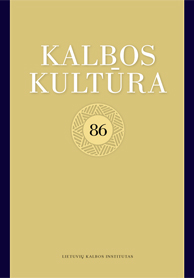TARPTAUTINIŲ ŽODŽIŲ SEMANTIKOS POKYČIAI ADMINISTRACINĖJE KALBOJE
CHANGES IN THE SEMANTICS OF INTERNATIONAL WORDS IN ADMINISTRATIVE LANGUAGE
Author(s): Rasuolė VladarskienėSubject(s): Theoretical Linguistics, Applied Linguistics, Semantics, Comparative Linguistics, Baltic Languages
Published by: Lietuvių Kalbos Institutas
Keywords: international word; semantics; polysemy of words; administrative language;
Summary/Abstract: The polysemy of words is one of the relevant problems relating to the functioning of international words, because languages usually borrow one or several meanings of a polysemous word rather than all of them. Administrative language, being one of the fields of usage of international words, was selected for the research. After comparing the definitions of the meanings of international words used in administrative language that are presented in the dictionaries of international words published in 1985, 2001 and 2013, an obvious tendency can be observed – the number of meanings of polysemous international words in the Lithuanian language is growing. The new meanings of international words are secondary literal meanings, which are often required to name something which exists in a narrow field. It is rather common to provide new meanings to international words in administrative language when it is required to name the procedures (e.g. iniciatyva, konsultacija, schema) or actions (e.g. autorizacija, notifikacija, sertifikacija, verifikacija, validacija) pertaining to regulation and administration processes. Yet another case – the new meanings of international words established in dictionaries are figurative. In rare cases when new dictionaries present fewer meanings of international words, an expanded denotatum is described by them. The changes in the semantics of international words are unavoidable; when new secondary meanings of words are clearly linked with primary ones, they easily establish themselves in general usage, because language users have no doubt as to how they should be understood. However, such new meanings of international words whose association with the primary meaning in the Lithuanian language is difficult to explain are generally avoided (e.g. ekscelencijos centras).
Journal: Bendrinė kalba (iki 2014 metų – Kalbos kultūra)
- Issue Year: 2019
- Issue No: 92
- Page Range: 1-13
- Page Count: 13
- Language: Lithuanian

